
Computers and Education Open
Scope & Guideline
Fostering collaboration in educational innovation.
Introduction
Aims and Scopes
- Technology Integration in Education:
The journal emphasizes research on integrating various technological tools into educational practices, focusing on frameworks like TPACK (Technological Pedagogical Content Knowledge) to guide educators in effectively using technology. - Artificial Intelligence and Education:
There is a significant focus on the implications of artificial intelligence in educational settings, examining how AI can enhance learning experiences, teacher training, and curriculum development. - Professional Development for Educators:
The journal investigates methodologies for professional learning and development for educators, emphasizing evidence-based practices and the effective use of digital platforms for training. - Student Engagement and Learning Outcomes:
Research published in the journal often explores the impact of technology on student engagement, motivation, and learning outcomes, providing empirical evidence on effective teaching strategies. - Data Privacy and Ethics in Educational Technology:
A critical area of focus includes the ethical implications of using technology in education, particularly concerning student data privacy and the responsibilities of educational institutions.
Trending and Emerging
- Artificial Intelligence Literacy:
There is an increasing focus on developing frameworks and assessments for AI literacy among educators and students, highlighting the importance of understanding AI's role in education. - Immersive Learning Technologies:
Research on the use of immersive technologies, such as virtual and augmented reality, is on the rise, showcasing their potential to create engaging learning experiences and enhance student understanding. - Data-Driven Decision Making in Education:
The trend towards utilizing data analytics for improving educational practices and outcomes is emerging, with studies exploring how data can inform teaching strategies and curriculum design. - Collaborative Learning Environments:
There is a growing interest in researching collaborative learning models, particularly in online settings, which emphasize peer interaction and co-agency among students. - Social Media and Digital Engagement:
Explorations of social media's role in education, including its impact on student engagement and learning processes, are becoming more prevalent, reflecting the digital landscape in which students operate.
Declining or Waning
- Traditional Classroom Practices:
Research on conventional teaching methods is becoming less prominent as the focus shifts towards technology-enhanced learning environments and innovative pedagogical approaches. - General Studies on ICT without Specific Contexts:
Publications that discuss ICT (Information and Communication Technology) in a generic manner, without contextual applications or frameworks, are declining as researchers seek more targeted and applicable insights. - Non-Digital Learning Tools:
There is a noticeable decrease in studies focusing on non-digital tools and methods, as the journal increasingly prioritizes research that highlights the integration of digital technologies in education.
Similar Journals
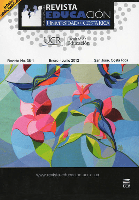
Revista Educacion
Championing Collaborative Research in EducationRevista Educación is a prestigious academic journal published by Universidad de Costa Rica, Editorial, dedicated to advancing the field of education through scholarly research and innovative pedagogical practices. Established as an Open Access journal since 1977, it aims to provide unrestricted access to high-quality research, fostering a collaborative environment for educators, researchers, and students to share knowledge and insights. With a commitment to addressing contemporary educational challenges in Costa Rica and beyond, Revista Educación serves as a vital forum for disseminating original research articles, case studies, and theoretical discussions that engage a diverse audience. The journal’s dedication to enhancing educational practices makes it an essential resource for those seeking to contribute to the field of education while promoting inclusive and equitable access to educational resources.
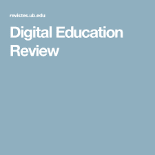
Digital Education Review
Empowering Learning with Cutting-Edge ResearchDigital Education Review, published by the University of Barcelona, stands at the forefront of the Digital and Educational Technology field, offering a valuable platform for researchers, educators, and policymakers since its inception as an Open Access journal in 2010. With an emphasis on innovative practices and critical evaluations in digital education, the journal has garnered an impressive standing within the academic community, achieving rankings of Q3 in Computer Science Applications and Q2 in Education for 2023, alongside a notable position in the 71st percentile of Social Sciences - Education rank (447 out of 1543). The journal aims to foster interdisciplinary dialogue and disseminate research that influences educational transformation through digital means. Based in Spain, the Digital Education Review not only promotes high-quality research but also engages with a global audience, making it a pivotal resource for those dedicated to advancing the understanding of digital educational practices.

E-Learning and Digital Media
Fostering collaboration between education and technology.E-Learning and Digital Media, published by SAGE Publications Inc, is a premier academic journal dedicated to the innovative intersection of digital technologies and education. With a strong commitment to advancing research in the fields of education and computer science, this journal has established itself as a vital resource for researchers, professionals, and students alike. As of 2023, it proudly holds a Q2 ranking in both Computer Science Applications and Education, reflecting its impact and reach within the academic community. The journal encompasses a wide range of topics exploring the effectiveness and applications of e-learning technologies, pedagogical strategies, and digital media in educational settings. Since its inception in 2009, E-Learning and Digital Media has continuously contributed to the understanding and development of digital education, ensuring relevancy in an ever-evolving landscape. With an open access model intended to foster accessibility and dissemination of knowledge, this journal invites submissions that push the boundaries of traditional education through cutting-edge research and practice.
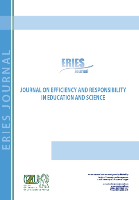
Journal on Efficiency and Responsibility in Education and Science
Fostering Excellence in Education and ScienceJournal on Efficiency and Responsibility in Education and Science, published by CESKA ZEMEDELSKA UNIV & PRAZE, stands as an essential resource in the field of education research. With an ISSN of 2336-2375 and an E-ISSN of 1803-1617, this Open Access journal has been dedicated to disseminating high-quality scholarly work since its inception in 2010, ensuring wide-ranging accessibility for academics and practitioners alike. Based in the Czech Republic, the journal invites contributions that explore innovative practices and sustainable approaches in education and science, with an impactful Scopus ranking position in the 46th percentile among Social Sciences education journals. The journal is recognized in the 2023 category quartiles as Q3 in Education, reflecting its commitment to facilitating rigorous research and discussion. The coverage spans from 2008 to 2024, making it a vital reference for those engaged in advancing educational efficiency and responsibility.

Educar
Empowering Educators with Cutting-edge ResearchEducar, published by the Universitat Autònoma de Barcelona, stands as a significant contributor to the fields of education, communication, and human-computer interaction. With an Open Access policy since 1982, this journal provides an invaluable platform for the dissemination of innovative research and insightful perspectives from diverse academic backgrounds. The journal boasts a commendable position in the 2023 category quartiles, ranking Q2 in Communication and Q3 in both Education and Human-Computer Interaction, which underscores its relevance and influence within these disciplines. Educar is indexed in Scopus and reflects a strong reception in the academic community, with its Social Sciences - Communication category ranked 173rd out of 511 journals, affirming its 66th percentile standing. Researchers and professionals will find this journal particularly useful for accessing a wide range of studies that not only push the boundaries of knowledge but also offer practical insights that enhance educational practices and technological engagement.

Journal of Computers in Education
Redefining Education with Groundbreaking Digital Solutions.The Journal of Computers in Education is a distinguished academic journal published by SPRINGER HEIDELBERG, dedicated to advancing the intersection of technology and pedagogy. With an ISSN of 2197-9987, this journal has established itself as a pivotal resource for researchers and educators alike since its inception in 2019, maintaining a strong focus on innovative applications of computer science within educational contexts. Ranked in the Q1 category in both Computer Science Applications and Education, the journal demonstrates a high impact in its field, holding a remarkable position within the top 1.5% of journals in social sciences (rank #20/1543) and top 5.5% in computer science applications (rank #45/817). The journal's scope encompasses a wide range of topics including but not limited to educational technologies, e-learning methodologies, and the effective integration of computers in teaching, making it an essential source for professionals and students who are keen to explore cutting-edge research and trends. Although access options vary, the journal's commitment to disseminating quality research continues to enrich the academic landscape in Germany and beyond, nurturing the synergies between education and technology.
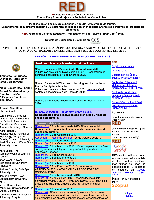
RED-Revista de Educacion a Distancia
Advancing Distance Education Through Innovative ResearchRED-Revista de Educacion a Distancia is a premier open-access journal published by UNIV MURCIA in Spain, dedicated to advancing research in the fields of education and computer science applications. Since its inception in 2001, the journal has served as an essential platform for disseminating innovative research and practical applications of distance education methodologies. With an impressive impact factor and ranked in Q2 across both Computer Science Applications and Education categories as of 2023, RED is recognized for its significant contribution to the scholarly community, particularly within the Social Sciences and Engineering domains. Researchers and professionals are invited to explore cutting-edge studies that underpin pedagogical effectiveness and technological integration in educational settings. Based at the Edificio Pleiades Campus de Espinardo in Murcia, RED continues to foster an engaging dialogue among academics, providing insights that propel the field forward.
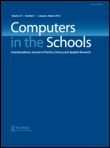
COMPUTERS IN THE SCHOOLS
Connecting technology and education for impactful learning.COMPUTERS IN THE SCHOOLS, published by ROUTLEDGE JOURNALS, TAYLOR & FRANCIS LTD, is a pivotal scholarly journal dedicated to exploring the intersection of technology and education. With an impressive publishing history dating back to 1984 and ongoing contributions until 2024, this journal provides a comprehensive platform for researchers and educators to disseminate innovative ideas and practices related to the use of computers in educational settings. Although the journal does not currently offer Open Access options, it maintains an esteemed position in the academic community, evidenced by its Q2 ranking across multiple categories including Computer Science, Education, and Library and Information Sciences in 2023. It is particularly valued for its rigorous peer-review process which ensures high-quality contributions. With its ISSN of 0738-0569, COMPUTERS IN THE SCHOOLS serves as an essential resource for advancing knowledge, fostering best practices, and influencing policy in the integration of technology into schools, making it indispensable for educators, researchers, and practitioners striving to enhance learning experiences through innovative technological approaches.

Contemporary Educational Technology
Connecting Research and Practice in Educational TechnologyContemporary Educational Technology is a premier journal published by BASTAS PUBL LTD - UK, specializing in the dynamic intersection of educational practices and technological advancements. With an E-ISSN of 1309-517X, this journal serves as a vital resource for researchers, educators, and professionals keen to explore innovative solutions and methodologies in education. Ranked in the Q2 category for both Education and Management of Technology and Innovation in 2023, Contemporary Educational Technology boasts impressive Scopus ranks, standing at #187 out of 1543 in the Social Sciences Education field, reflecting its influence and contribution to contemporary research. Through its open-access approach, this journal facilitates the dissemination of knowledge, making cutting-edge research readily available to a global audience. By examining developments from 2018 through 2024, it aims to critically analyze and promote the integration of technology in educational contexts, thereby fostering improved learning outcomes and innovative teaching practices.
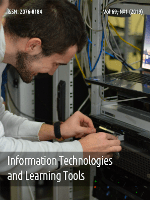
Information Technologies and Learning Tools
Empowering Education Through Innovative Technology.Information Technologies and Learning Tools is a pioneering scholarly journal dedicated to the exploration and dissemination of knowledge within the rapidly evolving field of educational technology. Published by the NATIONAL ACADEMY OF EDUCATIONAL SCIENCES OF UKRAINE, INSTITUTE OF DIGITALIZATION EDUCATION, this journal has maintained its Open Access policy since 2006, ensuring that groundbreaking research is readily available to educators, researchers, and practitioners worldwide. With the ISSN 2076-8184, the journal serves as a critical platform for innovative studies focusing on the integration of information technologies into educational practices, seeking to bridge gaps between digital tools and effective learning methodologies. Despite the absence of specific rankings, its commitment to advancing educational theories and applications positions it as an essential resource for professionals and students striving to enhance learning experiences through technology. As the educational landscape continues to transform, Information Technologies and Learning Tools stands at the forefront, fostering collaboration and knowledge sharing across diverse academic communities.